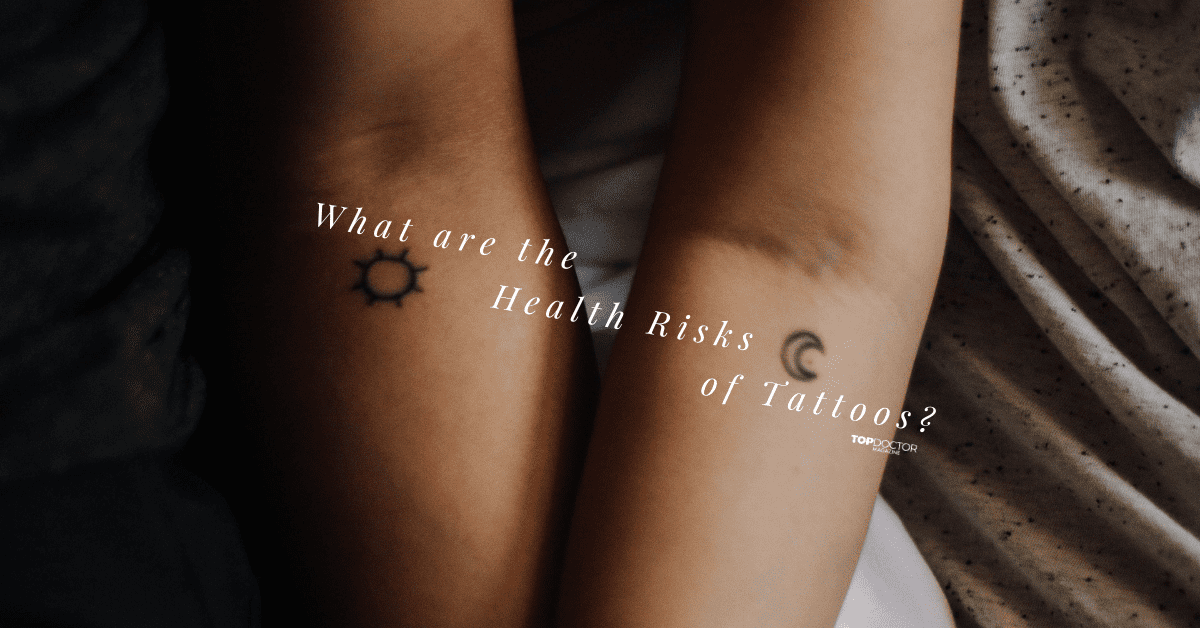While tattoos and piercings can be safe when done properly, there are some health risks that you should be aware of when you start your journey into body art.
First of all, when you get a tattoo, you’re essentially creating an open wound on your skin; therefore, there is a risk of infection and irritation anytime you get a tattoo.
Skin Allergies from Tattoos
Skin allergies are the most common type of reaction to tattoos. The inks used in tattoos can contain various metals, such as nickel, copper and cobalt, which can cause skin irritation and lead to an allergic reaction. Symptoms of a skin allergy from a tattoo could include redness, itching, swelling and blistering at the tattoo site. In severe cases, an allergic reaction to a tattoo can cause anaphylaxis, a life-threatening condition. If you experience any of these symptoms, it is vital to see a physician as soon as possible.
In addition, tattoo ink can be toxic. Some inks have been known to contain heavy metals such as mercury, cadmium and lead. These toxins could enter your bloodstream and cause various health problems.
Skin Infection from Tattoos
Tattoos can also cause skin infections, such as abscesses, cellulitis and granulomas. Granulomas are raised bumps that form around materials the body perceives as foreign, such as tattoo pigments. Cellulitis is a skin infection occurring when bacteria enter the skin through a crack or break. Skin abscesses are pus-filled bumps that occur when bacteria invade an area of skin.
Other skin infections that may occur from tattoos include staph infection and MRSA infection. These infections can be severe and even life-threatening if they are not treated promptly. It is crucial to make sure that your artist uses sterile needles and clean equipment to reduce your risk of infection. If you have any health concerns, it is always best to consult with a doctor before getting a tattoo.
Skin Cancer from Tattoos
If you wonder if getting a tattoo might give you skin cancer, the simple answer is no. There is no definitive evidence linking tattoos with cancer. While specific tattoo ink components may be classified as carcinogenic, there is still a lack of evidence showing a connection between them and skin cancer. However, there may be some concern with black tattoos because black inks contain a very high level of benzo(a)pyrene, a polycyclic aromatic hydrocarbon classified as a skin carcinogen.
Blackout tattoos may increase the skin cancer risk because of the amount of ink required for such tattoos. However, no available studies show a correlation between these types of tattoos and cancer. Even a mice study shows that black ink tattoos might protect the skin from skin cancer by blocking UVB light.
Does a Tattoo Affect MRI?
There is a small risk of tattoos interfering with MRI scans. MRI machines use strong magnetic fields to produce images, and, in rare cases, tattoo ink may cause burns or skin irritation during an MRI scan.
A study from University College London has shown various reactions from tattoos during an MRI scan. Researchers reported that adverse effects include a pulling sensation on tattooed skin due to tattoo ink containing magnetic pigments that interact with the MRI’s powerful magnetic fields. Tattoos may also absorb energy that would otherwise be dispersed, increasing burn risk.
Despite these risks, the long-term effects of MRI on skin with tattoos remain unclear. Some studies have found that skin cells can become damaged after exposure to high doses of energy in MRIs, potentially resulting in skin cancer. However, further research is needed to determine whether this effect is limited only to skin cells directly exposed to the magnetic field during an MRI or if it could affect skin cells throughout the body.
Given these potential health risks, people who get tattoos should consult their doctors before undergoing an MRI. Although the risk is generally considered low, if you have a tattoo, it’s important to let your doctor know before having an MRI scan.
If you decide to go ahead with an MRI scan, staying still and speaking as little as possible during your procedure will help minimize any adverse effects. Additionally, always follow your doctor’s recommendations for pre and post-scan care.
Tattoos and Bloodborne Pathogens
Another risk involved in tattooing is the transmission of bloodborne pathogens like tetanus, hepatitis B, hepatitis C and even HIV. These diseases can be contracted if the needles or other instruments are not properly sterilized. In addition, contaminated inks can also lead to infection.
These infections may also occur if the skin is not adequately sterilized prior to getting a tattoo or if proper precautions are not taken during the tattooing process. Choose a reputable, clean tattoo parlor that adheres to strict safety standards when performing your tattoo to reduce your risk of infection and exposure to dangerous bloodborne pathogens. Additionally, always follow any aftercare instructions provided by your tattoo artist to ensure proper skin healing following the procedure.
A Parting Reminder
In general, the risks of tattoos are relatively low, but it’s important to be aware of the potential risks and take precautions to minimize them. Be sure to research and choose a reputable tattoo artist who uses sterile equipment and safe inks.
If you have questions about the health risks associated with tattoos, consult a healthcare professional for advice on best protecting yourself during and after this procedure.






0 Comments